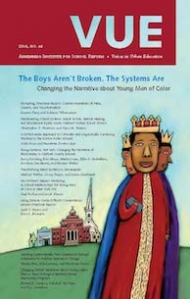Scholars and practitioners around the country are collaborating to build an asset-based counter-narrative about young men of color and develop concrete, evidence-based strategies to better serve them in schools and classrooms.
The Boys Aren’t Broken, The Systems Are: Changing the Narrative about Young Men of Color

Scholars and practitioners in school districts around the country are collaborating to build an asset-based counter-narrative about young men of color and develop evidence-based strategies to better serve them. However, these change agents do not always have a chance to work with their peers in other districts to collectively challenge structural racism.
This issue of Voices in Urban Education builds on a 2017 conference, sponsored by the American Educational Research Association (AERA) and organized by NYU and AISR, that aimed to address this need. Researchers and practitioners from seven sites gathered in New York City to share system-level strategies that challenged deficit mindsets and implicit bias, nurtured healthy and respectful relationships, and developed culturally sustaining practices. In this VUE issue, you will read some of their stories.
A deep district-wide commitment to racial equity for African American male students, based on the framework of targeted universalism, has laid the foundation for expanding the focus to include African American girls, Latino/a students, and Asian and Pacific Islander students.
The district’s system-wide professional development on culturally sustaining practices creates consistent expectations for educators to address their biases, build relationships with students and parents, and improve instruction – and gives them the tools to do so.
In Guilford County (NC), the district aimed to change adults’ beliefs and practices, rather than “fix” boys of color, by improving relationships between teachers and students and addressing implicit bias among educators, working in two areas: early literacy and discipline policies.
After getting input from parents and families, community members, educators, and young Black males themselves, the district launched a program to recruit Black men from the community as content experts, “cultural translators,” and adult role models to teach a class for Black boys.
A program centered around the concept of Umoja (“unity”) highlights the importance of positive in-school relationships for young men of color and describes how those relationships help them to succeed in school and deal with trauma in their lives.
The superintendent and an education researcher in Rochester (NY) present a framework for grounding difficult conversations on race and implicit bias in system-level data, to avoid blaming and shaming and to break through defensiveness to arrive at solutions.
A quantitative evaluation of a school-based group counseling and mentoring program for young men of color showed positive results, but did not explain why the program worked; qualitative research revealed mechanisms leading to the program’s success.
Strong institutional partnerships led to the development of a research agenda and mentoring program for young Latino men that has yielded local results in Austin (TX) and scaled up to state and national networks.








